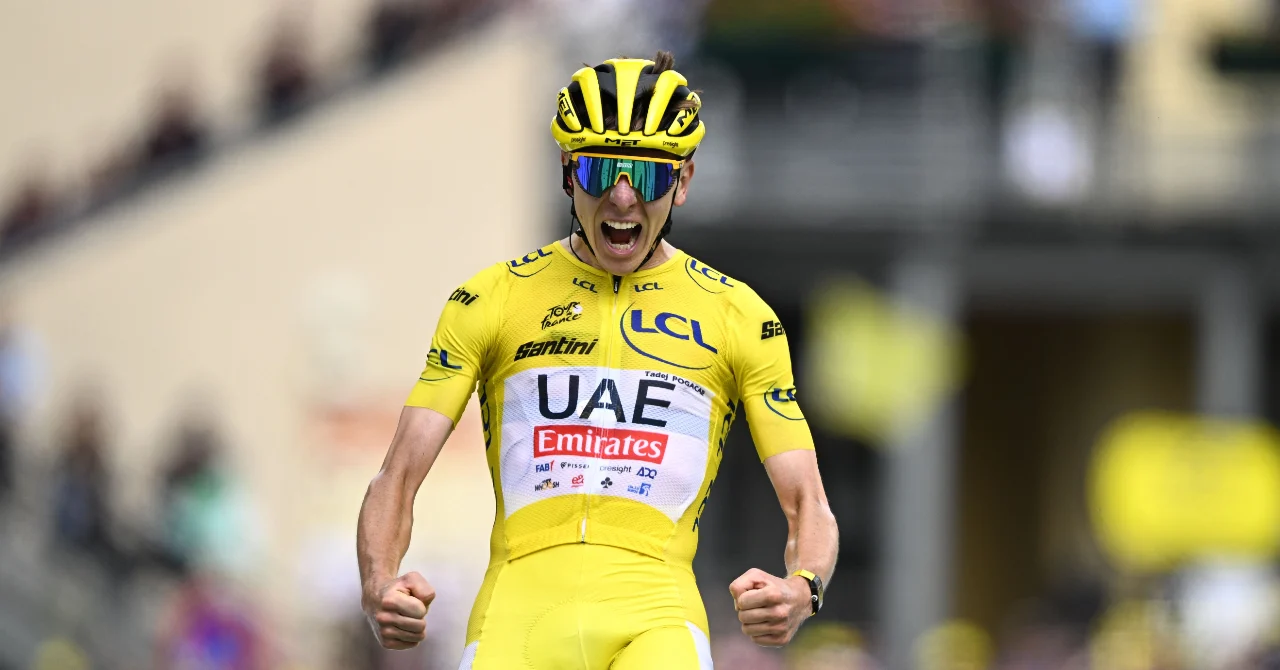
In a heated segment on the Dutch talk show *Vandaag Inside*, football analyst Jack van Gelder launched serious accusations of doping against Tadej Pogacar, the reigning champion of the Tour de France. Van Gelder’s comments have stirred significant controversy within the cycling community, especially as Pogacar continues to dominate the race with remarkable performances. His scepticism regarding Pogacar’s abilities raises questions about the integrity of the sport and reflects ongoing concerns about doping in professional cycling.
The Accusation: A Bold Statement
During the discussion, van Gelder was asked about Pogacar’s performance in the ongoing Tour de France. His response was marked by disbelief and scepticism, asserting that it is implausible for athletes to improve their performances continually without the aid of performance-enhancing substances. “Of course, I don’t believe in a doping-free Tour de France,” he stated emphatically. “They keep finding new things. It cannot be that they keep riding faster and performing better. It’s simply not possible.”
Van Gelder’s comments were particularly pointed when he referenced Pogacar’s recent record-breaking climb on Plateau de Beille, where he surpassed Marco Pantani’s previous best by nearly four minutes. “Pogacar has no limits: he rides four minutes faster than anyone in history has ever done,” van Gelder claimed, suggesting that such extraordinary feats could only be achieved through doping or other illicit means.
The analyst concluded with a prediction: “In a few years, you’ll hear who won.” This statement not only casts doubt on Pogacar’s achievements but also echoes sentiments from a dark chapter in cycling history, where numerous champions were later stripped of titles due to doping violations.
The Cycling Community Reacts
Van Gelder’s accusations did not go unnoticed, sparking outrage among cycling fans, commentators, and former professionals alike. Many took to social media to express their discontent with his unfounded claims. Thijs Zonneveld, a prominent cycling journalist, responded sharply to van Gelder’s statements, sarcastically questioning his qualifications to assess the limits of human performance. “Ah, Jack van Gelder is now also a medical specialist who knows exactly the limits of the human body,” Zonneveld tweeted.
The backlash highlights a growing frustration within the cycling community regarding unfounded allegations that can tarnish an athlete’s reputation. Critics argue that while scepticism is warranted given cycling’s history with doping, accusations should be based on evidence rather than speculation.
Tadej Pogacar’s Response
In light of van Gelder’s comments, Tadej Pogacar has maintained his focus on racing while addressing the scepticism surrounding his performances. During a press conference following one of his stage victories, he stated, “In every sport, if someone wins, there are always haters. If you don’t have haters, you’re not successful.” His remarks reflect an understanding that success often comes with scrutiny and criticism.
Pogacar also emphasised the strides made within cycling to ensure clean competition. “The World Anti-Doping Agency (WADA) and the UCI have invested significant resources into making our sport clean,” he noted. “I believe cycling is one of the cleanest sports today because of what happened in the past.” His defence underscores a commitment to transparency and integrity in an era where athletes are increasingly held accountable for their actions.
The Legacy of Doping in Cycling
The shadow of doping looms large over professional cycling, particularly following high-profile scandals involving riders like Lance Armstrong and Alberto Contador. The fallout from these controversies has led to heightened awareness of doping practices and an increased emphasis on anti-doping measures.
Cycling has made significant progress since those dark days; however, lingering doubts remain among fans and analysts alike. Van Gelder’s comments tap into this scepticism and reflect broader concerns about whether current athletes can truly compete without resorting to performance-enhancing drugs.
The historical context surrounding doping in cycling makes it imperative for athletes like Pogacar to continuously prove their legitimacy. As they strive for greatness on the world stage, they must also combat perceptions rooted in past transgressions.
The Role of Media in Shaping Perceptions
Media coverage plays a crucial role in shaping public perceptions of athletes and their performances. Van Gelder’s accusations will undoubtedly receive widespread attention and could influence how fans view Pogacar moving forward. This reality underscores the responsibility that commentators and analysts have when discussing sensitive topics like doping.
As social media amplifies voices—both supportive and critical—athletes must navigate an increasingly complex landscape filled with opinions from all corners. This environment can create additional pressure for competitors who already face immense expectations on race day.
The Future of Cycling: A Call for Transparency
The fallout from van Gelder’s accusations raises important questions about how cycling can continue to evolve while addressing lingering concerns regarding doping practices within the sport. As more young riders emerge on the scene—like Pogacar—the industry must prioritise transparency and accountability if it hopes to regain trust among fans.
Cycling organisations must ensure that robust anti-doping measures remain in place while fostering an environment where athletes feel empowered to compete cleanly without fear of stigma or suspicion.
A Controversial Legacy
Jack van Gelder’s recent accusations against Tadej Pogacar have reignited discussions about doping in cycling—an issue that continues to cast shadows over even the most talented athletes today. While some may appreciate van Gelder’s insights based on personal experience within competitive sports, many others view them as unfounded accusations aimed at undermining a rising star.
As Tadej Pogacar navigates this tumultuous landscape while striving for success at this year’s Tour de France, he serves as both an inspiration and a reminder that integrity matters just as much as talent within sports! With each passing stage come fresh opportunities for growth—and perhaps even new rivalries waiting to unfold!
Leave a Reply